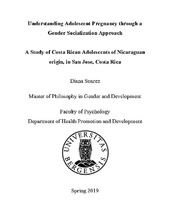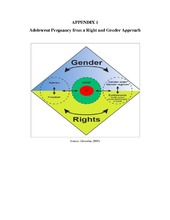| dc.description.abstract | Although, teenage pregnancy is a well-studied phenomenon, with large amounts of research in terms of the biomedical and socio-economic repercussions, very little is known about adolescents’ fertility and the gender norms involved in their sexuality. Given the high prevalence of teenage pregnancy of Costa Rican adolescents of Nicaraguan origin, this research sought to explore the role that gender norms, ideologies, and practices have, influencing these teenagers’ sexual and reproductive decisions. To reach this goal, this study took a qualitative approach based on interviews and focus groups discussions that aimed to uncover the diversity of experiences that adolescents hold. The study was framed using a right and gender approach, in which early childbearing was understood not only as a socio-economic phenomenon but also as an expression of unequal gender relations that constrain adolescents' sexual and reproductive health rights. Gender relations were found to be conditioned by the machismo-Marianism order, in which adolescents’ sexuality was found to be conditioned by the sexual double standard, where men and women are praised by opposite behaviors. While men are praised by being sexually active and promiscuous, women are expected to be chaste and sexually naïve; females’ sexual agency was considered a threat to femininity, and thereby, was depicted as undesirable and inappropriate. Young females’ emerging fertility represented a source of risk that is controlled through behavioral regulation and monitoring. Whereas girls are maintained at home to ensure their safety, boys are raised with autonomy and freedom. Finally, girls were raised to take the lead in the household chores, to be well-prepared to serve their husbands, and to idealized maternity as females’ destiny. Overall, findings suggest that adolescents’ sexuality is governed by contradictory pressures that most risk approaches to pregnancy fail to account. Understanding the repercussions of traditional forms of masculinity and femininity would provide helpful and practical insights for the design of more effective interventions that protect and empower these youths. | en_US |

